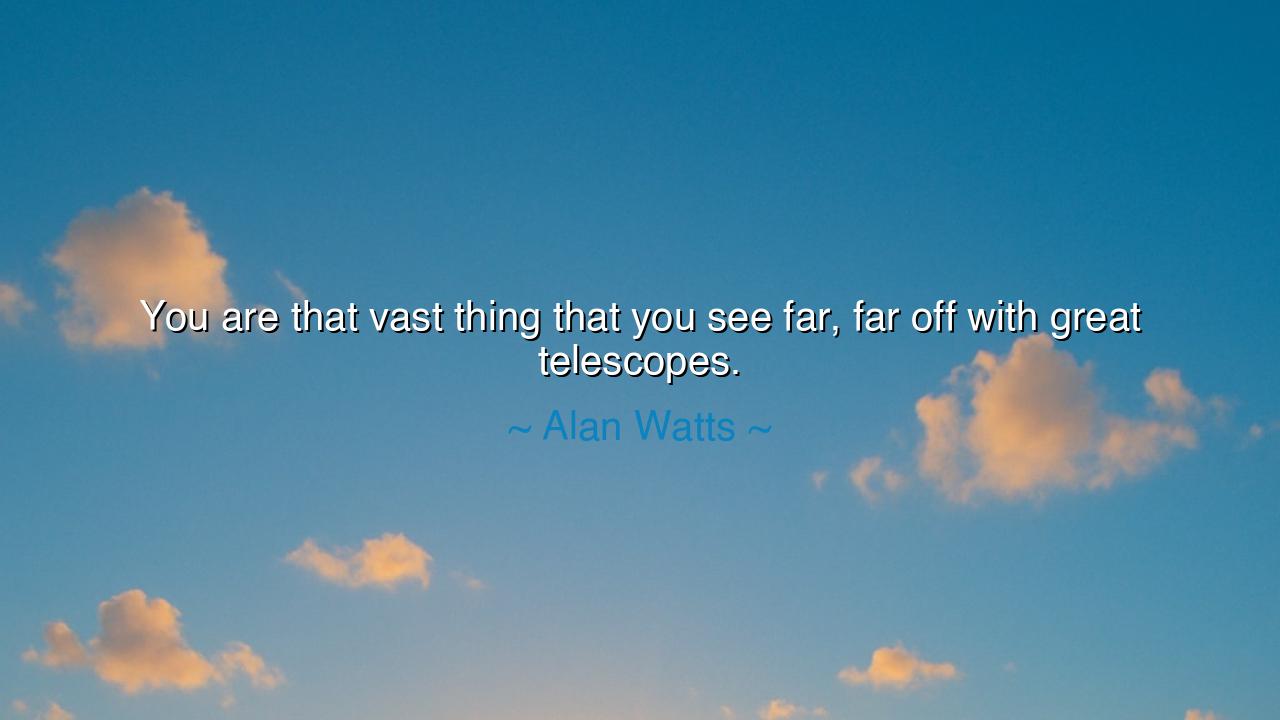
You are that vast thing that you see far, far off with great






In the words of Alan Watts, “You are that vast thing that you see far, far off with great telescopes.” These words shine like a revelation whispered from the edge of eternity. In them lies the essence of what the ancients knew but modern man has forgotten — that the observer and the observed are one, that the soul is not a small flame trapped in a mortal cage, but the universe itself awakened to consciousness. Watts, that philosopher of wonder, reminds us that we are not strangers in the cosmos but the cosmos become aware of itself. When we gaze into the stars, it is not we who look at them, but the universe looking at its own reflection.
The origin of this quote lies in Watts’ lifelong devotion to bridging Eastern mysticism and Western philosophy. He drank deeply from the wells of Taoism, Buddhism, and Vedanta, finding in them a truth that transcended dogma — that the self is not isolated, but infinite. The line itself is an echo of ancient spiritual teachings, from the Upanishads, which declared “Tat Tvam Asi” — “Thou art That” — to the wisdom of Lao Tzu, who said that the one who knows himself knows Heaven. Watts sought to awaken the modern soul to this same realization: that the separation between man and cosmos is illusion, that what we call “I” is but the ocean forgetting it is water.
When he says, “You are that vast thing,” he speaks of the unity of existence — the idea that the same power which spins galaxies also beats within your heart. The stars you behold through the telescope are not foreign lights scattered across an empty void; they are the distant fires of your own being. You are not a fragment adrift in the universe — you are the universe expressing itself as a fragment. The light of the stars and the light within you are born of the same flame, the same great mystery that has neither beginning nor end. To know this is to dissolve the fear of insignificance, for what is small in form may yet be infinite in essence.
Consider the story of Carl Sagan, who, like Watts, looked to the stars and found wonder rather than despair. When he described Earth as a “pale blue dot,” drifting in a cosmic sea, he did not mean to diminish humanity but to ennoble it. For if that tiny point of light holds the laughter, love, and dreams of billions, then it too is holy — not because it is grand, but because it contains the universe entire. The astronomer and the mystic both arrive at the same truth by different roads: that the cosmos is not “out there,” but within us, folded into the depths of consciousness. The telescope and the mind are both instruments of revelation, showing us the same infinity, mirrored from without and within.
To grasp Watts’ insight is to awaken from the great dream of separation — the illusion that you are merely a creature adrift in time, gazing at stars beyond your reach. The truth is that the stars dwell inside you; their light burns in your blood, their elements are the dust of your bones. When you look through the telescope, you are the cosmos beholding itself, marveling at its own majesty. This is not a metaphor, but a fact written into every atom of your being. You were not born into the universe; you emerged as the universe, momentarily shaped into human form.
And yet, to realize this truth is not to become arrogant, but humble. For if you are one with all things, then there is no “other” — no being too small to love, no life too insignificant to honor. The vastness within you demands reverence toward all existence, for every living thing shares your substance. The same mystery that burns in the stars burns in the eyes of your neighbor, in the heart of a bird, in the silence of a stone. To see this, truly see it, is to live with a reverence that transforms every act — to eat, to breathe, to speak — into a prayer of belonging.
Let this then be the lesson: never again see yourself as apart from the world you behold. When you feel lost or small beneath the heavens, remember that the stars are not above you, but within you — that you are that vast thing, dreaming itself into form. When you look at the night sky, let your awe become remembrance: you are not a spectator to the cosmos, but a participant in its eternal dance. Honor that truth in how you live — seek harmony rather than dominion, curiosity rather than fear, compassion rather than indifference.
For in the end, to understand Watts’ words is to awaken to the oldest truth of all: that the universe is not an “it,” but a “we.” You are the cosmos made conscious, the eternal observing itself through mortal eyes. And when you finally see that the stars are your own reflection, you will no longer fear the dark — for you will know that the dark too is sacred, and that everything, from the faintest atom to the farthest galaxy, is you, and has always been.






AAdministratorAdministrator
Welcome, honored guests. Please leave a comment, we will respond soon